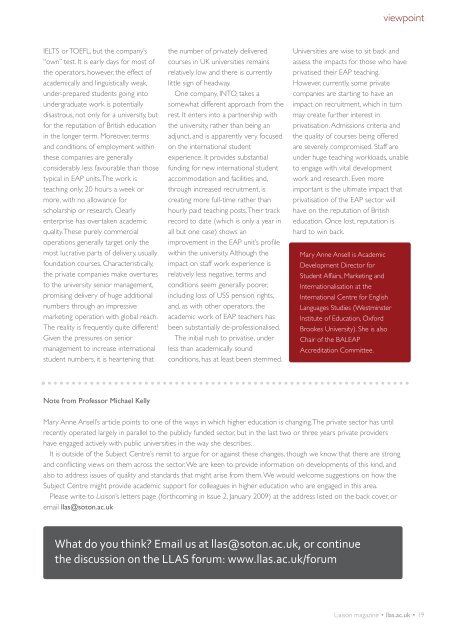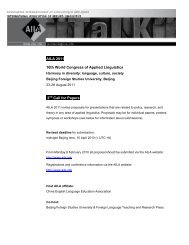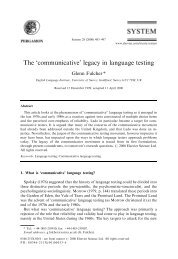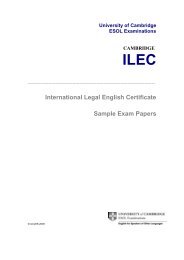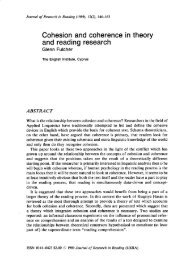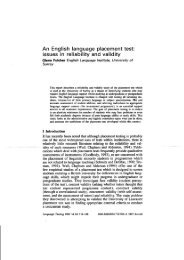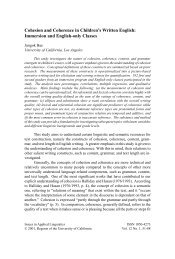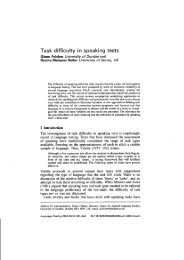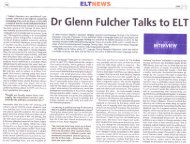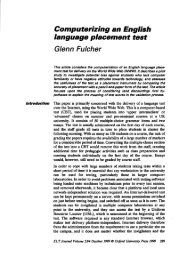Liaison Magazine - LLAS Centre for Languages, Linguistics and ...
Liaison Magazine - LLAS Centre for Languages, Linguistics and ...
Liaison Magazine - LLAS Centre for Languages, Linguistics and ...
Create successful ePaper yourself
Turn your PDF publications into a flip-book with our unique Google optimized e-Paper software.
viewpoint<br />
IELTS or TOEFL, but the company’s<br />
“own” test. It is early days <strong>for</strong> most of<br />
the operators, however, the effect of<br />
academically <strong>and</strong> linguistically weak,<br />
under-prepared students going into<br />
undergraduate work is potentially<br />
disastrous, not only <strong>for</strong> a university, but<br />
<strong>for</strong> the reputation of British education<br />
in the longer term. Moreover, terms<br />
<strong>and</strong> conditions of employment within<br />
these companies are generally<br />
considerably less favourable than those<br />
typical in EAP units.The work is<br />
teaching only; 20 hours a week or<br />
more, with no allowance <strong>for</strong><br />
scholarship or research. Clearly<br />
enterprise has overtaken academic<br />
quality.These purely commercial<br />
operations generally target only the<br />
most lucrative parts of delivery, usually<br />
foundation courses. Characteristically,<br />
the private companies make overtures<br />
to the university senior management,<br />
promising delivery of huge additional<br />
numbers through an impressive<br />
marketing operation with global reach.<br />
The reality is frequently quite different!<br />
Given the pressures on senior<br />
management to increase international<br />
student numbers, it is heartening that<br />
the number of privately delivered<br />
courses in UK universities remains<br />
relatively low <strong>and</strong> there is currently<br />
little sign of headway.<br />
One company, INTO, takes a<br />
somewhat different approach from the<br />
rest. It enters into a partnership with<br />
the university, rather than being an<br />
adjunct, <strong>and</strong> is apparently very focused<br />
on the international student<br />
experience. It provides substantial<br />
funding <strong>for</strong> new international student<br />
accommodation <strong>and</strong> facilities <strong>and</strong>,<br />
through increased recruitment, is<br />
creating more full-time rather than<br />
hourly paid teaching posts.Their track<br />
record to date (which is only a year in<br />
all but one case) shows an<br />
improvement in the EAP unit’s profile<br />
within the university. Although the<br />
impact on staff work experience is<br />
relatively less negative, terms <strong>and</strong><br />
conditions seem generally poorer,<br />
including loss of USS pension rights,<br />
<strong>and</strong>, as with other operators, the<br />
academic work of EAP teachers has<br />
been substantially de-professionalised.<br />
The initial rush to privatise, under<br />
less than academically sound<br />
conditions, has at least been stemmed.<br />
Universities are wise to sit back <strong>and</strong><br />
assess the impacts <strong>for</strong> those who have<br />
privatised their EAP teaching.<br />
However, currently, some private<br />
companies are starting to have an<br />
impact on recruitment, which in turn<br />
may create further interest in<br />
privatisation. Admissions criteria <strong>and</strong><br />
the quality of courses being offered<br />
are severely compromised. Staff are<br />
under huge teaching workloads, unable<br />
to engage with vital development<br />
work <strong>and</strong> research. Even more<br />
important is the ultimate impact that<br />
privatisation of the EAP sector will<br />
have on the reputation of British<br />
education. Once lost, reputation is<br />
hard to win back.<br />
Mary Anne Ansell is Academic<br />
Development Director <strong>for</strong><br />
Student Affairs, Marketing <strong>and</strong><br />
Internationalisation at the<br />
International <strong>Centre</strong> <strong>for</strong> English<br />
<strong>Languages</strong> Studies (Westminster<br />
Institute of Education, Ox<strong>for</strong>d<br />
Brookes University). She is also<br />
Chair of the BALEAP<br />
Accreditation Committee.<br />
Note from Professor Michael Kelly<br />
Mary Anne Ansell’s article points to one of the ways in which higher education is changing.The private sector has until<br />
recently operated largely in parallel to the publicly funded sector, but in the last two or three years private providers<br />
have engaged actively with public universities in the way she describes.<br />
It is outside of the Subject <strong>Centre</strong>’s remit to argue <strong>for</strong> or against these changes, though we know that there are strong<br />
<strong>and</strong> conflicting views on them across the sector.We are keen to provide in<strong>for</strong>mation on developments of this kind, <strong>and</strong><br />
also to address issues of quality <strong>and</strong> st<strong>and</strong>ards that might arise from them.We would welcome suggestions on how the<br />
Subject <strong>Centre</strong> might provide academic support <strong>for</strong> colleagues in higher education who are engaged in this area.<br />
Please write to <strong>Liaison</strong>’s letters page (<strong>for</strong>thcoming in Issue 2, January 2009) at the address listed on the back cover, or<br />
email llas@soton.ac.uk<br />
What do you think Email us at llas@soton.ac.uk, or continue<br />
the discussion on the <strong>LLAS</strong> <strong>for</strong>um: www.llas.ac.uk/<strong>for</strong>um<br />
<strong>Liaison</strong> magazine • llas.ac.uk •19


